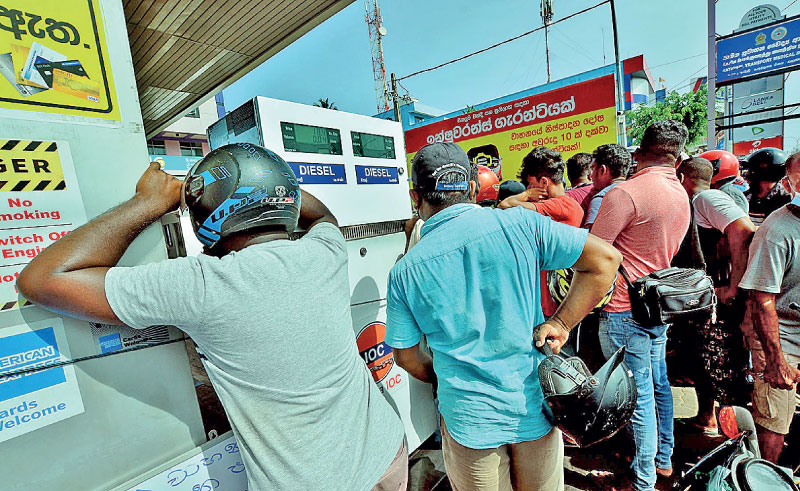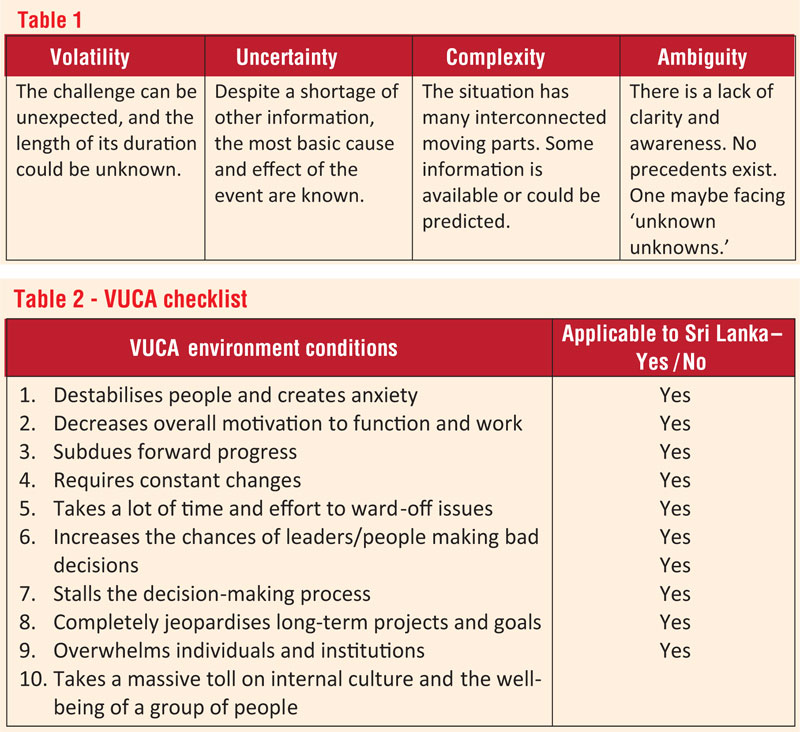Friday Feb 20, 2026
Friday Feb 20, 2026
Thursday, 21 July 2022 00:47 - - {{hitsCtrl.values.hits}}

As Sri Lankans, we are most definitely living in a VUCA environment at present, given the country’s current fractured social, cultural and economic standing – Pic by Shehan Gunasekara
 VUCA was first introduced to the business world nearly three and a half decades ago as part of a set of leadership theories. VUCA (which stands for Volatility, Uncertainty, Complexity and Ambiguity) remained important, but dormant in the business-lexicon for some period. However, it was brought back into the mainframe discussion by none other than the US Army in the post 9/11 world of national security.
VUCA was first introduced to the business world nearly three and a half decades ago as part of a set of leadership theories. VUCA (which stands for Volatility, Uncertainty, Complexity and Ambiguity) remained important, but dormant in the business-lexicon for some period. However, it was brought back into the mainframe discussion by none other than the US Army in the post 9/11 world of national security.
Furthermore, it became part of the learning curriculum at the US Army War College during that time. In addition, the term was further repurposed in the wake of the 2008 Great Recession to discuss the recession’s cascading effects on the business world and its aftermath weaving between corporations, leadership, and the future of the financial world in general.
VUCA, deconstructed
VUCA is not a toolkit, a model, or a framework. It is a set of conditions (or challenges) that represent our experiences within a transformational period in business, society, or a country. Taken individually, each of these conditions can be challenging. However, as a combined force, VUCA can be a substantial adversary for any individual or institution to grapple with. This could lead to systemic breakdowns such as what is currently experienced in Sri Lanka. As Sri Lankans, we are most definitely living in a VUCA environment at present, given the country’s current fractured social, cultural and economic standing.
What is VUCA to Sri Lanka?
To say that Sri Lanka as a country is currently in its most volatile, uncertain, complex and ambiguous phase is an understatement. It’s been an insidious experience within so many walks of life. The country, over the past two and a half years, with its political, economic, and social decay has glacially descended into its current VUCA environment.
Table 2 displays a basic 10-item VUCA checklist that could be applied (and checked) against Sri Lanka.
Volatility
Sri Lanka’s myriad of problems are no longer only at its doorstep. Those problems, en masse, have already made its way into the house and has made itself home already. Therefore, we as a country are beyond volatility’s ‘unexpected stage’ condition currently. However, the duration of our problems, and its inflicted suffering upon our people does not have to remain an ‘unknown.’
Short to medium term volatility is a given right now. As a matter of fact, majority of Sri Lankans have been living under extreme hardships for the better part of 2022. As it stands, those hardships are expected to continue for the remainder of 2022 (and quite possible beyond).
Turning a challenge into an opportunity:
The good news is that most Sri Lankans have accepted this life challenge, and the recently ousted former head-of-state, is a scathing referendum of the people’s want for change. For Sri Lanka, the way out of a volatile situation is to create a set of compelling objectives that the country would need to achieve over the short, medium, and longer term tied to a clear vision for the future of the country and its people.
Uncertainty
The basis of uncertainty in a VUCA environment stems from a lack of information. Especially, to understand the cause and effect of different, and often pernicious policy decisions that have led to varying degrees of social and economic breakdowns within the country. However, an argument could be made within this context that, information was on offer, however, responsible parties did not, or categorically refused to take them into consideration when making (subsequent national policy) decisions.
Turning a challenge into an opportunity:
The interim president (and his government) should take a cue from his predecessor to first understand all problems fully, and all the snowball effects each of these problems have collectively caused upon the country. One of the main causes of uncertainty is when policy/decision reviews and evaluations fall by the wayside. In retrospect, it lays bare a wicked-irony for a president who blazed his way to ascendency trumpeting oracle databases and data-driven decision-making only to adhere to none of that.
However, opportunity lies for the new government to tackle uncertainty through a prism of understanding problems using strategy maps, scenario planning, crisis planning, and other pertinent planning tools to generate foresight to avoid future uncertain situations.
Complexity
Clearly, Sri Lanka’s current problems are a multi-headed Hydra right now. Cut one down and another grows in its wake. Not only are many of these problems interconnected and constantly moving, but they also require interconnected, often dynamic responses as their solutions. One of the biggest detriments of the ousted-president and his close acolytes was their inability (or lack of wanting) to clearly communicate their problems and proposed plans to the people of Sri Lanka. Or worse, they were rather content to use misdirection and false narratives to assure a false safety net when the country was at the precipice of economic destruction.
Turning a challenge into an opportunity:
A policy of clear communication of problems and potential solutions to the masses is a no brainer. Also, the government would need to develop and promote collaboration within the teams that it puts together to work on finding solutions to all the different problems.
These teams will have to work in a fast-paced environment, void of all government red-tape and bureaucracy to achieve their objectives as the country’s populace has been suffering in dire straits for months on end.
Ambiguity
Again, in retrospect, most of Sri Lanka’s people who cared enough had a keen awareness and clarity on where the country was heading with the implementation of the previous regime’s hare-brained national policies.
However, the ones that counted; those who were the decision-making heads, lacked clarity and awareness to foresee and overcome all the issues the country is currently facing.
Turning a challenge into an opportunity:
The hallmark of a transformational government would be to replace ambiguity with flexible, adaptable and agile teams. Yes, one could make a prescient argument that historically, governments and public service officials of Sri Lanka have been the exact opposite of these three fundamental progressive principles.
On the other hand, one of the main caveats of being flexible, adaptable and agile, is to hire and bring in specialists who are competent in the skills required to implement those changes. Sri Lanka is not without the competency and talent to make changes happen. It is just that the leadership vacuum and blithe disdain towards maintaining strategy, clarity and transparent commitment is what has kept those intellectuals away for this long.
A mechanism to move away from ambiguity towards clarity will coalesce around national leadership (i.e., the president, his cabinet, and his top advisors), collaboration, and consensus amongst the rank and file (within government institutions) to fulfil set KPIs and objectives to achieve a collective positive outcome.
The way forward
One of the principal challenges of overcoming a VUCA environment is overcoming resistance and pushback. Overcoming a VUCA environment, which the country is already in is going to require a completely different way of operating all governmental institutions. There is bound to be resistance and pushback stemming from all walks of rank and file. It’s natural for humans to stick to so-called ‘tried and tested’ methods of the past and refuse change. Especially, in the public service in Sri Lanka.
The beauty of a resultant governance mechanism stemming from a VUCA environment is that it renders authoritative, top-down, ‘my way or the highway’ leadership styles obsolete and moot. We’ve already tried that out and have failed miserably.
Avoiding inert, traditional, and outdated approaches to national governance and management would be a fruitful way forward for the country to drag itself out of the current predicament it is in.
That would be all our collective wish!

Source: